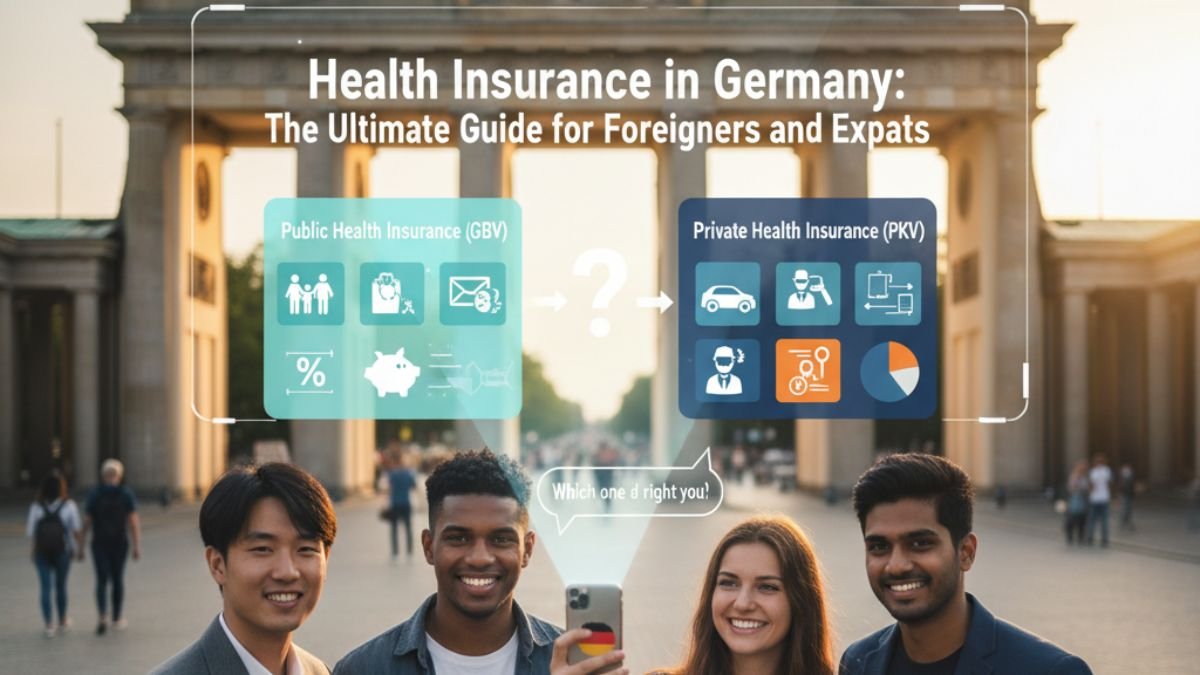Health Insurance in Germany: Guide for Foreigners and Expats

Health insurance is mandatory for all residents in Germany, including foreigners. Your eligibility for public (statutory) or private health insurance depends on your employment status, income, and duration of your stay.
This guide will walk you through everything you need to know about securing health insurance in Germany, from understanding the different systems to choosing the right plan for your needs.
The German Health Insurance System: A Dual Approach
Germany operates on a dual public-private healthcare system. The majority of residents are covered by public health insurance (Gesetzliche Krankenversicherung – GKV), while a smaller portion opts for private health insurance (Private Krankenversicherung – PKV). The choice between the two depends on various factors, including your income, employment status, and personal preferences.
Public Health Insurance (GKV): The Standard for Most
The public health insurance system is the backbone of German healthcare. It’s accessible to most employees, students, and their dependents.
Who is eligible for GKV?
- Employees earning less than the annual income threshold (Jahresarbeitsentgeltgrenze), which is adjusted periodically.
- Students under the age of 30.
- Apprentices and interns.
- Family members (spouses and children) of a publicly insured person can often be co-insured at no extra cost (Familienversicherung).
- Freelancers and self-employed individuals who were previously publicly insured in an EU country.
How much does GKV cost?
The cost of public health insurance is a percentage of your gross income, currently at a general rate of 14.6%. This is typically split equally between the employee and the employer. On top of this, each public health insurance fund (Krankenkasse) charges an additional contribution (Zusatzbeitrag), which can vary. For students, there’s a discounted, fixed monthly premium.
What does GKV cover?
Public health insurance provides comprehensive coverage for a wide range of medical services, including:
- Visits to doctors and specialists.
- Hospital stays and treatments.
- Prescription medications.
- Basic dental care.
- Pregnancy and childbirth.
- Preventative check-ups.
Private Health Insurance (PKV): An Alternative for Some
Private health insurance offers an alternative for those who are not obligated to be in the public system or who prefer more extensive coverage and services.
Who is eligible for PKV?
- Employees with a gross annual income exceeding the income threshold.
- Self-employed individuals and freelancers.
- Students over the age of 30, language course participants, and PhD students.
- Civil servants (Beamte).
How much does PKV cost?
Unlike the income-based contributions of the GKV, private health insurance premiums are based on individual risk factors such as age, health status, and the level of coverage chosen. Younger and healthier individuals will generally pay lower premiums. It’s important to note that each family member requires a separate policy.
What does PKV cover?
Private plans often offer more extensive benefits and greater flexibility, which can include:
- Shorter waiting times for appointments with specialists.
- Access to private doctors and clinics.
- More comprehensive dental coverage, including orthodontics and professional cleanings.
- Private or semi-private hospital rooms.
- Coverage for alternative treatments like naturopathy.
Choosing Between GKV and PKV: Key Considerations for Expats
The decision between public and private health insurance is significant and should be made carefully. Here’s a quick comparison to help you decide:
| Feature | Public (Statutory) Health Insurance (GKV) | Private Health Insurance (PKV) |
|---|---|---|
| Eligibility | Mandatory for employees earning below the 2025 income threshold of €73,800 per year. Also available to students under 30 and those who have a history of German or EU public insurance. | Optional for employees earning above the income threshold. Mandatory for most self-employed people, freelancers, and students over 30. |
| Cost | Calculated as a percentage of your income (approx. 14.6% in 2025, plus an additional provider-specific fee). The cost is capped, and employers cover half of the premium for employees. | Premiums are based on age, health, occupation, and desired coverage. Can be cheaper for young, healthy, high-earning individuals but gets more expensive with age. |
| Dependents | Includes free coverage for a non-working spouse and children, provided they don’t exceed a low monthly income threshold. | Each family member requires a separate policy, at an additional cost. |
| Coverage | Standardized, comprehensive coverage across providers, with minor variations in extra benefits like travel vaccines. Covers general practitioners, hospital stays, basic dental, and prescription drugs with a small co-payment. | Offers more flexibility and can include better service, shorter wait times, single hospital rooms, and access to private doctors. Broader dental and optical coverage may also be included. |
| Payment process | You present your electronic health card, and the insurer bills the provider directly. You only pay for small co-payments. | You typically pay upfront for services and then submit the invoices to your insurer for reimbursement. |
| Pre-existing conditions | Covers pre-existing conditions without extra fees. | Pre-existing conditions may lead to higher premiums or even rejection by some providers, although basic tariff options may be available. |
Specific situations for foreign nationals
- EU/EEA/Swiss citizens: Your European Health Insurance Card (EHIC) provides access to emergency and necessary medical care during a temporary stay. For long-term stays, you must register with a German health insurance provider.
- Foreign workers: If your annual income is below the mandatory insurance threshold (2025: €73,800), you will be enrolled in public health insurance. If you earn more, you can choose public or private.
- Foreign students: Most students under 30 can opt for public health insurance at a subsidized student rate. Students over 30, doctoral candidates, and those on preparatory or language courses generally require private insurance.
- Self-employed/freelancers: You are not automatically eligible for public insurance but can voluntarily join if you were previously publicly insured in Germany or the EU. Otherwise, private health insurance is required.
- Jobseekers: Non-EU citizens must arrange for private health insurance.
- New arrivals/visa applicants: You will likely need proof of valid health insurance to get your residence permit. Short-term “guest” or “incoming” insurance is often used to cover the period before long-term German insurance begins.
Health Insurance for Your German Visa and Residence Permit
Proof of adequate health insurance is a mandatory requirement for obtaining a German visa and residence permit. For your initial visa application, you will likely need to show proof of travel health insurance that covers you from your arrival date in Germany. Once in Germany and registered, you will need to enroll in either a public or private health insurance plan to secure your long-term residence permit.
How to get started
- Determine your eligibility: First, assess your status based on your income, age, and occupation to see if you qualify for public or private insurance.
- Compare providers: If you have a choice, research different public and private insurers. For public insurance, most major providers (like TK, AOK, or Barmer) offer similar core benefits, but some have better English support or added extras.
- Apply and register: You can apply directly with an insurance provider or use an intermediary like Feather or Expatrio, which offer digital enrollment in English. For most employees, your employer will assist with the initial registration.
- Get your insurance card: After your application is approved, your public insurance provider will send you an electronic health card. Private insurance holders will receive a document outlining their coverage.
By understanding the German health insurance system and carefully considering your individual circumstances, you can make an informed decision and ensure you have the necessary coverage for a healthy and secure stay in Germany.
If you’re looking for more blog like Guide to the German Apotheke: How to Buy Medicine in Germany and Decoding the German Pfand System subscribe to join us.






